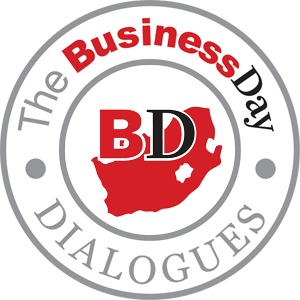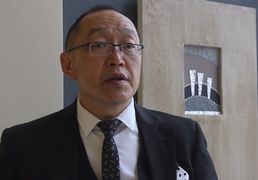Sue Blaine, Setumo Stone, Natasha Marrian, Franny Rabkin, Khulekani Magubane and Colleen Goko
CROWDS booed President Jacob Zuma at the huge, rain-soaked, memorial service for Nelson Mandela at the FNB Stadium in Johannesburg on Tuesday, embarrassing him in his own country in front of a global television audience and — sitting just behind him — the leaders of some of the world’s most powerful nations.
The hostile reception given Mr Zuma was in stark contrast to the cheers that greeted his predecessor, Thabo Mbeki, and the huge cheers for US President Barack Obama, Zimbabwean President Robert Mugabe and even for former apartheid president FW de Klerk.
African National Congress (ANC) deputy president Cyril Ramaphosa had to ask the crowd to behave as Mr Zuma spoke and also had to intervene to quieten the crowd during addresses by Indian President Pranab Mukherjee and African Union Commission chairwoman Nkosazana Dlamini-Zuma.
The jeers will have been a worrying sign to party organisers of the ANC’s strength in Gauteng, South Africa’s richest province, with a general election next year. The province was among those that sought change at the ANC’s internal elective conference last year.
The day was rescued, however, by speeches from Mr Obama and, at the end, Archbishop Emeritus Desmond Tutu, who good-naturedly scolded the crowd and got them to promise to honour Mr Mandela, democratic South Africa’s founding president.
The booing was not unanimous. Mr Zuma’s supporters cheered him in return. But he was booed on at least four occasions when his face appeared on the stadium’s big screens, particularly by a group in one corner of the 95,000-seat stadium.
Even Mr Mugabe received a warmer welcome, but arguably the loudest applause was for Mr Obama. Other candidates for that honour included Mr Mandela’s former wife, Winnie Madikizela-Mandela; his widow, Graça Machel, Ms Dlamini-Zuma and Deputy President Kgalema Motlanthe.
Mandela died last Thursday at 95, following a long illness.
Dignitaries including United Nations chief Ban Ki-moon and leaders from three other Brics nations — Brazilian President Dilma Rousseff, Chinese Vice-President Li Yuanchao and Mr Mukherjee — also spoke.
While this was the first international event at which Mr Zuma was booed, it is not the first time South Africans have called for him to be recalled from his post.
The Democratic Alliance threatened to call for Mr Zuma’s impeachment after the Mail & Guardian printed excerpts from Public Protector Thuli Madonsela’s draft report on the Nkandla millions. Ms Madonsela provisionally found Mr Zuma had misled Parliament and benefited substantially from about R20m worth of work that had nothing to do with security features at his home, including a swimming pool.
The Economic Freedom Fighters, the new party established by Julius Malema, who was expelled from the ANC Youth League, has also called for Mr Zuma’s political head, partly over Nkandla.
The government has had a long time to prepare for the memorial service — Mr Mandela’s health has been failing for years. Sadly, the service was marred by a two-hour delay, glitches with the stadium’s public address system, and with the public transport that was the only way for ordinary South Africans to get to the stadium. It also entailed embarrassing moments such as when Mr Ramaphosa, who acted as master of ceremonies, had to interrupt Mr Mukherjee to call on a brass band to cease playing.
The government was the main organiser of the event.
ANC spokesman Jackson Mthembu was overheard saying the "contrasting" of ANC leaders on the large screens in the stadium must be addressed. The images elicited excitement from the crowd, and disrupted speeches. Mr Mthembu said in an interview with Business Day the ANC would "not take responsibility for people behaving in a manner that we think is not appreciated".
Political analyst Somadoda Fikeni said it was significant that Mr Mandela’s death came so soon after controversies such as Nkandla and the government’s refusal to budge on the widely rejected e-toll payment scheme for upgrades to Gauteng’s highway system.
"The public mood and elements of frustration should be noted by the leaders," Mr Fikeni said. While there would be "an element of orchestrated booing", it would be a mistake to say everyone who behaved in that manner should be ignored, he said.
"It is also election season and people would believe that (the memorial) is a platform to express themselves," Mr Fikeni said.
Addressing the crowd, Mr Obama said it was hard to eulogise such a "giant of history", the last great liberator of the 20th century. While it was tempting to remember him as an icon, Mandela himself resisted such a lifeless portrayal, Mr Obama reminded the watching world.
"It is an honour to be with you today, to celebrate a life like no other. People of every walk of life, the world over, thank you for sharing Mandela with us. His struggle was your struggle," Mr Obama said.
Delivering his official speech, Mr Zuma said Mandela was "one of a kind". He announced the renaming of the Union Buildings’ amphitheatre, where Mr Mandela’s body is to lie in state until his burial in his hometown of Qunu on Sunday, as the Nelson Mandela Amphitheatre.
"When a man has done his duty to his country he can rest in peace," he said of the man who spent 27 years behind bars and who devoted more than 67 years of his life to a free and equal South Africa.
There were many times that Mandela had brought South Africa back from "the brink of catastrophe" during its transition from apartheid to democracy, Mr Zuma said. He referred specifically to the massacre at Boipatong in 1993 and the assassination of struggle hero Chris Hani that year.
Mr Zuma said Mandela had carefully managed the anger and frustration of the oppressor and the oppressed in South Africa’s transition to democracy. He had also never hesitated to speak his mind, no matter who he was speaking to, or how uncomfortable his words may have been to his listener.
Ms Rousseff described Mandela as "the most outstanding personality of the 21st century".
Speaking in her native Portuguese, Ms Rousseff first greeted Ms Machel, who is also the widow of former Mozambican president Samora Machel, who was killed in an aircraft crash, allegedly arranged by the apartheid government. Mozambique was a Portuguese colony, and the language is its lingua franca.
Mr Li, who sent condolences on behalf of Chinese President Xi Jinping, said Mr Mandela had been "the pride of the African people", who strove for the liberty of the continent’s people, dedicating his entire life to the development and progress of Africa.
Speaking of the man who trod lightly the narrow thread between China and Taiwan, Mr Li said Mandela had been "a friend of the Chinese people who had committed himself to South African-Chinese relations".
South Africa’s relationship with Taiwan has greatly diminished since Mandela’s term of office ended in 1999 and Mr Mbeki took the helm. Simultaneously, its relationship with China has strengthened.
Mr Li said China, ready to work with South Africa towards its development, was "glad" to see the country’s rise as a global power.
This rise has been boosted by China’s inviting South Africa to join the Bric group of emerging nations in December 2010, creating the formation now known as Brics.
Mr Mukherjee said Mandela had "pursued an impossible goal for his people. We, in India, have long admired him and all that he stood for, and we will always cherish him," he said. "Nelson Mandela was a visionary. He epitomised uncommon human ways that inspired all of mankind."
The final speaker, Archbishop Emeritus Desmond Tutu, tactfully scolded the restive crowd, calling on them to show discipline.
"I want to hear a pin drop."
While Israel had said it was "too expensive" to fly to South Africa for the service, its President Shimon Peres attended. Israel’s relationship with South Africa has soured as South Africa has increased support for the Palestinian cause.
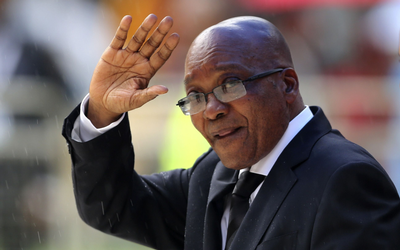
President Jacob Zuma waves as he arrives at the FNB Stadium for the national memorial service for former president Nelson Mandela in Johannesburg on Tuesday. Picture: REUTERS
CROWDS booed President Jacob Zuma at the huge, rain-soaked, memorial service for Nelson Mandela at the FNB Stadium in Johannesburg on Tuesday, embarrassing him in his own country in front of a global television audience and — sitting just behind him — the leaders of some of the world’s most powerful nations.
The hostile reception given Mr Zuma was in stark contrast to the cheers that greeted his predecessor, Thabo Mbeki, and the huge cheers for US President Barack Obama, Zimbabwean President Robert Mugabe and even for former apartheid president FW de Klerk.
African National Congress (ANC) deputy president Cyril Ramaphosa had to ask the crowd to behave as Mr Zuma spoke and also had to intervene to quieten the crowd during addresses by Indian President Pranab Mukherjee and African Union Commission chairwoman Nkosazana Dlamini-Zuma.
The jeers will have been a worrying sign to party organisers of the ANC’s strength in Gauteng, South Africa’s richest province, with a general election next year. The province was among those that sought change at the ANC’s internal elective conference last year.
The day was rescued, however, by speeches from Mr Obama and, at the end, Archbishop Emeritus Desmond Tutu, who good-naturedly scolded the crowd and got them to promise to honour Mr Mandela, democratic South Africa’s founding president.
The booing was not unanimous. Mr Zuma’s supporters cheered him in return. But he was booed on at least four occasions when his face appeared on the stadium’s big screens, particularly by a group in one corner of the 95,000-seat stadium.
Even Mr Mugabe received a warmer welcome, but arguably the loudest applause was for Mr Obama. Other candidates for that honour included Mr Mandela’s former wife, Winnie Madikizela-Mandela; his widow, Graça Machel, Ms Dlamini-Zuma and Deputy President Kgalema Motlanthe.
Mandela died last Thursday at 95, following a long illness.
Dignitaries including United Nations chief Ban Ki-moon and leaders from three other Brics nations — Brazilian President Dilma Rousseff, Chinese Vice-President Li Yuanchao and Mr Mukherjee — also spoke.
While this was the first international event at which Mr Zuma was booed, it is not the first time South Africans have called for him to be recalled from his post.
The Democratic Alliance threatened to call for Mr Zuma’s impeachment after the Mail & Guardian printed excerpts from Public Protector Thuli Madonsela’s draft report on the Nkandla millions. Ms Madonsela provisionally found Mr Zuma had misled Parliament and benefited substantially from about R20m worth of work that had nothing to do with security features at his home, including a swimming pool.
The Economic Freedom Fighters, the new party established by Julius Malema, who was expelled from the ANC Youth League, has also called for Mr Zuma’s political head, partly over Nkandla.
The government has had a long time to prepare for the memorial service — Mr Mandela’s health has been failing for years. Sadly, the service was marred by a two-hour delay, glitches with the stadium’s public address system, and with the public transport that was the only way for ordinary South Africans to get to the stadium. It also entailed embarrassing moments such as when Mr Ramaphosa, who acted as master of ceremonies, had to interrupt Mr Mukherjee to call on a brass band to cease playing.
The government was the main organiser of the event.
ANC spokesman Jackson Mthembu was overheard saying the "contrasting" of ANC leaders on the large screens in the stadium must be addressed. The images elicited excitement from the crowd, and disrupted speeches. Mr Mthembu said in an interview with Business Day the ANC would "not take responsibility for people behaving in a manner that we think is not appreciated".
Political analyst Somadoda Fikeni said it was significant that Mr Mandela’s death came so soon after controversies such as Nkandla and the government’s refusal to budge on the widely rejected e-toll payment scheme for upgrades to Gauteng’s highway system.
"The public mood and elements of frustration should be noted by the leaders," Mr Fikeni said. While there would be "an element of orchestrated booing", it would be a mistake to say everyone who behaved in that manner should be ignored, he said.
"It is also election season and people would believe that (the memorial) is a platform to express themselves," Mr Fikeni said.
Addressing the crowd, Mr Obama said it was hard to eulogise such a "giant of history", the last great liberator of the 20th century. While it was tempting to remember him as an icon, Mandela himself resisted such a lifeless portrayal, Mr Obama reminded the watching world.
"It is an honour to be with you today, to celebrate a life like no other. People of every walk of life, the world over, thank you for sharing Mandela with us. His struggle was your struggle," Mr Obama said.
Delivering his official speech, Mr Zuma said Mandela was "one of a kind". He announced the renaming of the Union Buildings’ amphitheatre, where Mr Mandela’s body is to lie in state until his burial in his hometown of Qunu on Sunday, as the Nelson Mandela Amphitheatre.
"When a man has done his duty to his country he can rest in peace," he said of the man who spent 27 years behind bars and who devoted more than 67 years of his life to a free and equal South Africa.
There were many times that Mandela had brought South Africa back from "the brink of catastrophe" during its transition from apartheid to democracy, Mr Zuma said. He referred specifically to the massacre at Boipatong in 1993 and the assassination of struggle hero Chris Hani that year.
Mr Zuma said Mandela had carefully managed the anger and frustration of the oppressor and the oppressed in South Africa’s transition to democracy. He had also never hesitated to speak his mind, no matter who he was speaking to, or how uncomfortable his words may have been to his listener.
Ms Rousseff described Mandela as "the most outstanding personality of the 21st century".
Speaking in her native Portuguese, Ms Rousseff first greeted Ms Machel, who is also the widow of former Mozambican president Samora Machel, who was killed in an aircraft crash, allegedly arranged by the apartheid government. Mozambique was a Portuguese colony, and the language is its lingua franca.
Mr Li, who sent condolences on behalf of Chinese President Xi Jinping, said Mr Mandela had been "the pride of the African people", who strove for the liberty of the continent’s people, dedicating his entire life to the development and progress of Africa.
Speaking of the man who trod lightly the narrow thread between China and Taiwan, Mr Li said Mandela had been "a friend of the Chinese people who had committed himself to South African-Chinese relations".
South Africa’s relationship with Taiwan has greatly diminished since Mandela’s term of office ended in 1999 and Mr Mbeki took the helm. Simultaneously, its relationship with China has strengthened.
Mr Li said China, ready to work with South Africa towards its development, was "glad" to see the country’s rise as a global power.
This rise has been boosted by China’s inviting South Africa to join the Bric group of emerging nations in December 2010, creating the formation now known as Brics.
Mr Mukherjee said Mandela had "pursued an impossible goal for his people. We, in India, have long admired him and all that he stood for, and we will always cherish him," he said. "Nelson Mandela was a visionary. He epitomised uncommon human ways that inspired all of mankind."
The final speaker, Archbishop Emeritus Desmond Tutu, tactfully scolded the restive crowd, calling on them to show discipline.
"I want to hear a pin drop."
While Israel had said it was "too expensive" to fly to South Africa for the service, its President Shimon Peres attended. Israel’s relationship with South Africa has soured as South Africa has increased support for the Palestinian cause.


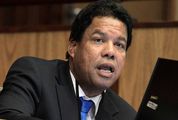
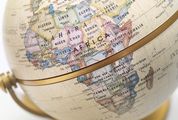
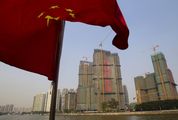
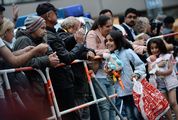


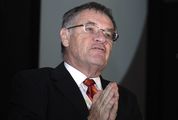
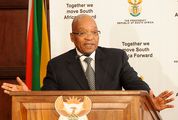
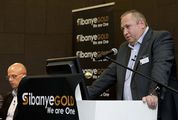
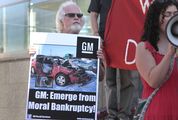
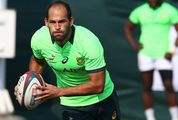
 News and views on the death, and life, of former president Nelson Mandela, with tributes and photographs
News and views on the death, and life, of former president Nelson Mandela, with tributes and photographs






